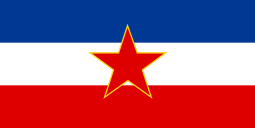Sweden in the Eurovision Song Contest 1974
The Swedish national selection for the Eurovision Song Contest was called Melodifestivalen 1974. It was, by far, won by the group ABBA, consisting of Anni-Frid Lyngstad, Agnetha Fältskog, Benny Andersson and Björn Ulvaeus. Their song was called "Waterloo", which was written by Björn and Benny. It was originally written in Swedish, but for the ESC final, it was translated into English, which the rules allowed the years 1973-1976.
ABBA was one of the favorites to win ESC, held in Brighton, United Kingdom. They sang as #08. In the voting, they received high points from the first jury to vote (Finland), but it was a close race until the second last jury, Switzerland, which gave Sweden enough points to practically secure victory. Sweden got a total of 24 points, compared to runner-up Italy's 18. This was Sweden's first victory, and ABBA got international superstar status, with a success second only to The Beatles. They have sold a reported 370 million records worldwide. In 2005, in the 50th anniversary show Congratulations, Waterloo was chosen the best Eurovision song ever.
At Eurovision
Voting
Every country had a jury of ten people. Every jury member could give one point to his or her favourite song.[1]
Points awarded to Sweden
| Points awarded to Sweden[1] |
| 10 points |
9 points |
8 points |
7 points |
6 points |
|
|
|
|
|
| 5 points |
4 points |
3 points |
2 points |
1 point |
 Finland Finland Switzerland Switzerland
|
|
 Netherlands Netherlands
|
|
 Ireland Ireland Luxembourg Luxembourg Portugal Portugal Spain Spain Yugoslavia Yugoslavia
|
|
Points awarded by Sweden[1]
| 3 points |  Netherlands Netherlands |
| 2 points | .svg.png) Greece Greece
 Ireland Ireland |
| 1 point |  Israel Israel
 Monaco Monaco
 Norway Norway |
|
References
 Sweden in the Eurovision Song Contest |
|---|
|
|
|
| Artists |
|---|
| 1950s | |
|---|
| 1960s | |
|---|
| 1970s | |
|---|
| 1980s | |
|---|
| 1990s | |
|---|
| 2000s | |
|---|
| 2010s | |
|---|
|
|
|
| Songs |
|---|
| 1950s | |
|---|
| 1960s | |
|---|
| 1970s | |
|---|
| 1980s | |
|---|
| 1990s | |
|---|
| 2000s | |
|---|
| 2010s | |
|---|
|
|
|
(Note: Entries scored out are when Sweden did not compete) |
|
|---|
|
| Countries |
|---|
| Final
(by final results) | |
|---|
| Withdrawn | |
|---|
|
|
|
| Artists |
|---|
| Final
(by final results) | |
|---|
| Withdrawn | |
|---|
|
|
|
| Songs |
|---|
| Final
(by final results) | |
|---|
| Withdrawn |
- "La vie à vingt-cinq ans"
- "Paċi Fid Dinja"
|
|---|
|
|